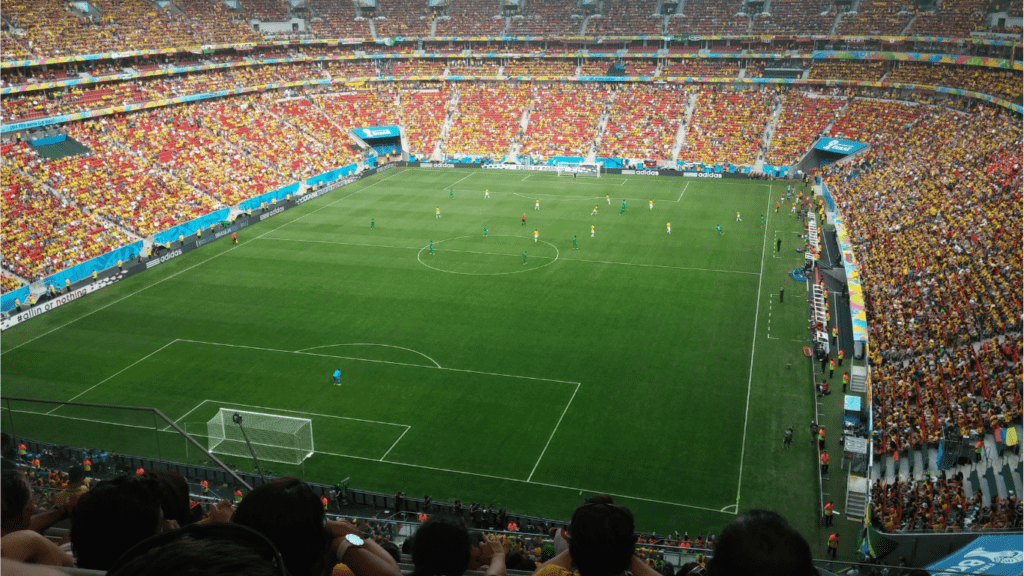Understanding Sponsorships in Sports Betting
Sponsorships play a crucial role in the sports betting industry. Sponsorships, particularly those involving high-profile leagues and teams, elevate brand visibility for betting companies while providing essential funding for sports organizations. For example, partnerships between global betting giants and premier football clubs enhance marketing reach and create additional revenue streams.
Benefits of Sponsorships
Enhanced Brand Recognition
Sponsorships significantly boost brand recognition. Betting companies often use stadium naming rights and jersey logos to ensure their brands are seen by millions of fans worldwide. This widespread visibility leads to higher brand recall and customer acquisition.
Financial Support for Sports Teams
Sports teams benefit financially from sponsorships. These partnerships provide crucial funding that supports team operations, player salaries, and youth development programs. This financial support is vital, especially for smaller clubs that rely on sponsorships for survival.
Types of Sponsorships
Stadium Naming Rights
Stadium naming rights are a common form of sponsorship. Companies pay substantial amounts to have their names associated with sports venues, providing long-term advertising benefits. This arrangement benefits both the sponsor, with sustained brand visibility, and the sports organization, with a significant revenue source.
Jersey Sponsorships
Jersey sponsorships are also prevalent. Betting companies place their logos on team uniforms to gain exposure during televised games and other events. Such placements increase brand reach, associating the betting company with successful and popular teams.
Impacts on Sports Culture
Fan Engagement
Sponsorships enhance fan engagement. By associating with sports teams and events, betting companies create promotional activities and offers that engage fans. These activities range from game-day betting tips to exclusive contests, fostering a deeper connection between the brand and the fanbase.
Integrity and Regulation
Sponsorships influence the integrity and regulation of sports betting. Reputable betting companies commit to responsible gambling practices and collaborate with regulatory bodies to ensure fair play. This commitment enhances the credibility of the sports betting industry and fosters a safer betting environment.
Sponsorships are integral to the global sports betting scene, driving brand visibility, financial support, and fan engagement while upholding industry standards.
Historical Context of Sponsorships in Sports Betting
Sponsorships in sports betting have a rich history, evolving significantly over the decades. Understanding this context helps grasp their current importance.
Early Influences
Early sponsorships in sports betting appeared in the late 20th century. Governments were the primary regulators, often imposing strict restrictions on betting advertisements. In the 1990s, several countries began easing these regulations, allowing betting companies to sponsor sports teams and events. For example, betting companies started partnering with soccer clubs in Europe, leveraging fan bases for brand exposure.
Significant Milestones
Several milestones mark the evolution of sports betting sponsorships. In 2002, Betfair became the first betting company to sponsor a soccer team, striking a deal with Fulham FC. This partnership set a precedent for future agreements. Another key moment occurred in 2012 when Bet365 secured the stadium naming rights for Stoke City’s Britannia Stadium, rebranding it to the Bet365 Stadium. This trend grew, with major deals emerging across various sports globally. By 2022, sponsorships involved not just stadiums, but also digital platforms like esports, reflecting the industry’s adaptive nature.
These milestones illustrate how sponsorships have shaped the sports betting landscape, driving both brand visibility and economic growth.
Key Players in Sports Betting Sponsorships

In the dynamic world of sports betting sponsorships, several key players drive the industry’s growth and visibility. These entities range from major sports leagues to leading betting companies.
Major Sports Leagues
Major sports leagues play a crucial role in the sports betting sponsorship landscape. The English Premier League (EPL) stands at the forefront, fostering partnerships with top betting companies to enhance fan engagement and generate significant revenue. Similarly, the National Football League (NFL) in the US has embraced sports betting sponsorships, striking deals with industry giants like DraftKings and FanDuel. These collaborations not only boost the leagues’ financial health but also expand the market reach of betting companies.
- English Premier League (EPL): Home to numerous betting partners, including Bet365 and Betway.
- National Football League (NFL): Collaborates with DraftKings and FanDuel, enhancing betting engagement.
Prominent Sports Betting Companies
Top sports betting companies drive the sponsorship ecosystem by aligning with major sports leagues and events. Bet365 ranks among the industry leaders, known for its extensive partnerships with various sports teams and leagues. Another significant player, Paddy Power, maintains a strong presence in European football through multiple sponsorship agreements. In the US market, companies like DraftKings and FanDuel lead sponsorship activities, capitalizing on the growing acceptance of sports betting.
- Bet365: Partners with numerous sports teams and leagues, including EPL teams.
- Paddy Power: Maintains significant partnerships in European football.
- DraftKings: Active in the US market, focusing on NFL and other major sports leagues.
- FanDuel: Engaged in sponsorships with multiple US sports entities.
These key players collectively shape the global sports betting sponsorship scene, driving economic growth and transforming fan engagement.
Benefits of Sponsorships for Sports Organizations
Sponsorships play a crucial role in the global sports betting scene, providing numerous advantages to sports organizations. These partnerships offer financial gains, boost brand visibility, and enhance fan engagement.
Financial Gains
Sponsorships provide essential financial support for sports organizations. These partnerships generate significant revenue, allowing teams to invest in infrastructure, training facilities, and player acquisition. For example, Bet365’s naming rights deal for Stoke City’s stadium provided substantial funds that were reinvested in the club. Smaller clubs, which struggle with financial stability, benefit greatly from these sponsorships, allowing them to compete at higher levels and improve overall performance.
Brand Visibility
Sponsorships significantly enhance brand visibility for both sports organizations and their betting partners. Stadium naming rights, jersey logos, and other branding opportunities create a constant presence in the public eye. When Betfair sponsored Fulham FC, the brand gained immense exposure through match broadcasts, merchandise, and fan interactions. This visibility helps sports teams attract additional sponsors and partnerships, further driving economic growth.
Fan Engagement
Sponsorships foster stronger fan engagement through various initiatives and promotions. Betting companies often create exclusive offers and activities for fans, enhancing their experience and loyalty. DraftKings and FanDuel, for instance, run promotions during NFL games that encourage fan participation and interaction. These activities not only boost fan engagement but also increase overall interest and viewership, contributing to the sport’s popularity.
Impact on Consumers and Athletes
Sponsorships in sports betting impact consumers and athletes significantly, influencing perceptions and ethical considerations.
Perception of Sports Integrity
Sports betting sponsorships affect how fans view the integrity of sports. When betting companies sponsor teams, it can raise concerns about the potential for match-fixing or other unethical behaviors. Fans might worry if games are played fairly or if athletes are influenced by external factors. To address these concerns, many leagues implement strict regulations and work with integrity bodies. For example, the English Premier League (EPL) collaborates with the Sports Betting Integrity Forum to monitor suspicious betting activities, ensuring transparency and fairness.
Ethical Considerations
Ethical concerns are paramount when dealing with sponsorships in sports betting. Prominent among these are the risks of promoting gambling to vulnerable audiences, including minors and problem gamblers. Betting companies must adhere to responsible marketing practices, avoiding aggressive promotions that target susceptible groups. Many organizations, such as the American Gaming Association (AGA), provide guidelines to ensure ethical advertising. Additionally, teams and sponsors often support responsible gambling initiatives, providing resources and assistance to those affected by gambling-related issues.
Regulatory Environment
Regulations in sports betting vary across different regions, heavily influencing how sponsorships operate in this sector. Let’s delve into the current regulations and future trends in this space.
Current Regulations
Current regulations shape sports betting sponsorships by setting clear boundaries. In Europe, countries like the UK, where the Gambling Commission oversees the industry, have stringent advertising guidelines. For example, betting advertisements can’t target minors, and companies must display responsible gambling messages. Spain introduced a Royal Decree in 2021 that restricts betting ads to late-night hours, impacting sponsorship deals with sports teams.
In the United States, the regulatory landscape is more fragmented. Each state sets its own laws, with some like New Jersey permitting extensive sports betting activities, while others maintain strict prohibitions. The repeal of PASPA in 2018 allowed states to legalize sports betting, leading to a surge in sponsorships. Companies like DraftKings and FanDuel quickly partnered with professional leagues to leverage these new markets.
Australia also has rigid rules. The Interactive Gambling Act regulates online sports betting and includes provisions against the promotion of unlicensed betting services. These regulations influence how betting companies can collaborate with sports organizations, limiting some promotional opportunities.
Future Trends
Future trends in sports betting regulations will likely focus on enhanced transparency and consumer protection. If regulatory bodies globally harmonize their rules, it might simplify sponsorship deals and create more opportunities for international partnerships. Cryptocurrencies might also play a role. Regulations will need to adapt if betting companies start accepting digital currencies widely, ensuring that such practices are transparent and secure.
We might see stricter rules around data privacy as betting platforms handle vast amounts of personal data. Stricter enforcement could impact how these companies market their services and collaborate with sports leagues. Additionally, regulations guiding responsible gambling practices will become more stringent, with companies expected to invest more in community support and prevention programs.
Emerging markets in Asia and Africa could see more defined regulations soon as governments recognize the economic benefits. These changes could open up new frontiers for sponsorships, with local regulations dictating the terms of engagement. Betting companies may need to navigate these evolving landscapes carefully, ensuring compliance while expanding their global footprint.



